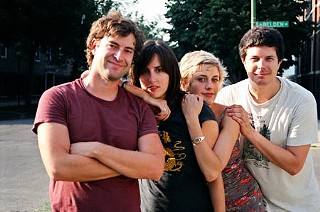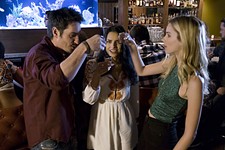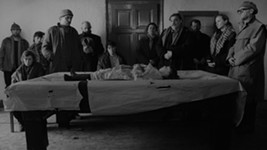Something Out of Nothing
Joe Swanberg, anti-director, on 'Hannah Takes the Stairs'
By Spencer Parsons, Fri., Oct. 26, 2007
Joe Swanberg is thinking about underwear. And of course he's thinking about it in a movie. "In what we'll be shooting, this couple is broken up, and this guy is returning to New York to do some business after being apart for a while, and he's going to see her while he's in town. And the thing I'm thinking about is that she should be wearing nice underwear in case they sleep together. I'm not thinking about dialogue or blocking or who kisses who first. I'm thinking about nice underwear ... and that's plenty."
What the director of Hannah Takes the Stairs tries not to think about is the much-hyped rise (and fall?) of a contemporary cinematic tendency – mostly young, white, and male – in which he is a key figure, winkingly dubbed Biggest Movement in this publication's "Best of Austin" issue not two weeks ago. The dreaded "M" word. "It's weird, because 'Mumblecore' is a term from within," Swanberg says. "And embarrassing that it's made up by the people making the films. But it was a joke. Not only that, it's a joke from 2005. And unfortunately, it's gone viral."
As one who was there when the joke got started, I can attest to his accuracy here and will take the opportunity to mention that this is the insider reportage of a friend with no pretense to proper, unconflicted journalism (full disclosure: Hannah producer Anish Savjani also produced the feature I'm finishing). But to catch everyone up, I'll summarize. A distinctly mild-mannered and nonrevolutionary group of filmmakers in their mid-20s to early 30s, who first meet up at South by Southwest and discover affinities in one another's work, make a joke about what they would be called were their films mistaken by unwitting press or publicists for an aesthetic movement. Eric Masunaga, the sound editor for Andrew Bujalski's Mutual Appreciation considered the films' propensity for fumbling, circular dialogue and, taking a cue from the naming of punk-derived music styles, mashed it up with "hardcore."
Bujalski playfully dropped the term in a couple of interviews, while others spread it by word of mouth, and not much came of it. Then over the summer, the New York premiere of Hannah Takes the Stairs, the DVD release of LOL, Swanberg's previous feature, and a multifilmmaker retrospective at the IFC center called the New Talkies, brought on a deluge. Critics and bloggers and advocates and haters flirted with other labels, like "Slackavettes," "Generation IM," and "MySpace Neorealism," but "Mumblecore" was the one that stuck, and for real, no longer as a joke. The technical term for this is "hoist on your own petard." Bujalski sighs, "I've learned a valuable lesson."
Of course, any of these movies is best approached as simply a movie (an experience that I'm now ruining for those who missed the fuss). After all, what unites them more than anything is their attention to small drama and quotidian detail. "If you're looking for a movement," Savjani says, "you're frankly looking for more than the filmmaker promises." Remember, Hannah Takes the Stairs is made by a guy who's after the dialogue and plotting that falls into place once he's figured out the right underwear. And in all the hubbub, it might be forgotten that he's been focused on developing as a storyteller and an observer of character.
His first film, Kissing on the Mouth, arrived as an exceptional student film, albeit a student film with explicit sex, delivered with remarkable naturalism and without a lot of fuss. It showed great potential without quite surmounting some of its technical or narrative limitations, but it made me a fan, and I was hardly the only one. Only a year later, LOL played like an energetic, youthful first feature and garnered well-deserved attention and praise. Now, Hannah Takes the Stairs is a comedy of discomfort, following the progress of a certain sort of mid-20s girl (Greta Gerwig) among the various guys to whom she's catnip (Mark Duplass, then Andrew Bujalski, then Kent Osborne).
Each successive relationship becomes a little more emotionally fraught than the last, prompting increasing worry about where her "chronic dissatisfaction" will carry her suitor and Hannah herself. This is a real movie, not so much traditionally plotted as carefully structured and bravely delivered as straight narrative, without the protective curtain of obvious formal experimentation or fancy editing to keep your eyes from prying after the man behind it.
The real difficulty of this becomes especially evident when one considers Swanberg's method. "Improv" has often been too often invoked in discussions of independent filmmaking since Cassavetes put that prankish title card at the end of Shadows, but no other American filmmaker I know, mumbling or not, engages in such radical and rigorous improvisation on every level. It's a dangerous sort of process to discuss, sure to be used as ammunition by detractors or to become the downfall of would-be disciples who think it can be easily imitated. It's a process marked by extreme vulnerability for all involved, forever in danger of pulling a "Mumblecore," or leaving everyone stranded in their underwear. So I talked with Joe and some of his chief collaborators about how they wouldn't have it any other way.
"I think sometimes about how Joe makes movies and how his ideas really change during the process, and I think that's good. With Hannah, for instance, it was originally going to be this more experimental, science-fiction-y thing in three different time frames. He can change so fast, and it isn't like that when you're tied to a script. ... But on the other hand, it totally consumes him. It can be hard to be his wife or even his collaborator, because he's not thinking about anything else." – Kris Swanberg, co-director, Young American Bodies
Joe Swanberg: You know, my whole approach – it's weird to say, but I really do approach it from the point of making the least work possible in preproduction and production and postproduction. So I'm shooting in a way to get as much in camera as I can and in as few takes as possible. Preproduction always gets cut short by going, "Well, we'll take care of it when you get here." And once I've shot, I know how I'm going to cut, and I never actually change it that much. Each step of the way, I'm working to make it easier.
Austin Chronicle: So that's how you make three features in three years!
JS: Well, my natural tendency is laziness. I force myself to work like this by talking to people and locking down dates. So that it's worse to not do it than to do it. I mean, only by creating a situation of making myself an asshole by not doing a project can I create conditions to get any work done. We just have to do it. And the thing is, I'm not that interested in my own good ideas. I'm more interested in others' ideas, and I can acknowledge that that comes out of selfishness. It's the way of working that appeals most to me, whether it gets the best results. So I really work hard to eliminate expectations, and I try to be open to anything.
I think it comes from bad film-school experiences of carefully constructing a film in my head but then trying to re-create this thing with real people in real situations and having it turn out bad. Why did it come out so crummy if it looked so good on paper? So I have to make myself free to find what the movie dictates rather than try to cram it into some preconceived notion.
AC: Okay, but then what guides you? I mean, how do you even get started?
JS: Well the harder thing to explain is how. ... I live with these movies 100 percent of the time from the point it comes into my head until I'm done with it. So yeah, there's no script, and we only do a couple takes, but I'm thinking about them all the time, and it's hard for me to explain how it manifests itself. Thinking about the themes and characters and atmosphere on the set, it obsesses me. All I'm thinking and talking about is the movie, and it's all hypothetical. It's not like working on the script and tinkering and storyboarding. Maybe it's like positive visualization, where they did that basketball study where the guys that just concentrated completely on imagining shooting baskets did even better than the other group of guys who were practicing.
But I'm forcing myself not to be making too much expectation about any take. My approach is always not to have any idea, so I can make something out of nothing.
AC: So have you ever gotten into a situation where your actors felt like they were just there to write the movie for you?
JS: Well, so far, nobody has come to me and said that, but I have to assume everybody feels that way to some degree. So I've been very generous with credit and making clear how much the movie belongs to everyone who's in it. I'm not in it to be an attention hog. I'm not sure the term director even applies to what I do. I'm an anti-director. I stay out of things. My instinct is to turn on the camera and stay totally quiet. If there were another term, I'd use it. But I am the one getting these projects going, and then I'm the last word in the editing process deciding about performances. And I guess that's what makes me the director.
"One of the oddest things about the way it would work was that we'd shoot a 40-minute take and get to a point where we could call cut, and then Joe would say, 'Great, now let's go back to the part where ...' And we'd be like, what? Because we couldn't remember what we'd done, ourselves. It could be pretty incredible the way Joe can listen and remember all these little details and keep it in his head well enough to work from what we did and shape something out of it." – Andrew Bujalski

AC: With a shooting style as improvisational as yours, it seems like chemistry in your casting would be really important.
JS: Yeah, but I don't think it ever came together in quite that kind of way. I had wanted to work with Mark [Duplass], and he became available for a good window, and then I also wanted to work with Andrew and Ry [Russo-Young], and with Kent [Osborne]. It's when Greta came on that the idea of chemistry even entered. Because she was going to carry the movie. But she was a fan of [the Duplass Brothers'] The Puffy Chair and Bujalski's work, and so we kind of knew putting her in a situation with these guys would make sense. But Kent was the X factor, so I brought the two of them together for a weekend in Chicago, and we shot a short together ("Thanks for the Add"), and it only took a little while before I knew, okay, this is going to work.
AC: And Greta really turns in a movie-star performance in this movie. How you two got started is actually pretty unusual in terms of a collaborative relationship.
JS: Yeah, it's kind of crazy. On LOL, I actually never directed her. She was Chris [Wells]' girlfriend, and I was working with him on the movie, and he came up with the idea of using some voice mail he'd gotten from her in the story, and that kind of grew, and so she contributed by sending him stuff over the phone. But I was working with Chris, and he was working with her.
Then when we premiered the movie in Austin, I was finally confronted with this digital entity and had to deal with that. So we were out together putting up posters around Sixth Street, and I vividly remember this tall, blond girl walking across the street toward us, and it's Greta. I remember stopping to say to myself that's the real Greta and not the camera-phone or voice-mail Greta.
And within a couple days, I was working with her on Young American Bodies, and I was amazed at how we were working with each other. She came down to Austin for a festival, and during that, we just jump into shooting scenes for the show, including this pretty intense sex scene, and she struck me as a real trooper, exactly the kind of person I wanted to work with.
So when she came along to the Philadelphia Film Festival, at that point, wheels were already in motion for Hannah, and I'd thought about her, and I think she knew that, and we were feeling each other out. And at the end, I ask her about it, because I was really ready to build it around her. Even though the film would be an ensemble in some ways, she would be my first lead, and I just knew she could do it.
AC: You've mentioned before that this is kind of a uniquely intense working relationship.
JS: Well, through this, our friendship has become more deep and interesting, and I don't think we even know what it is. I mean, it's strange because we're both very close to each other, but we really only know each other through this work we've made. There isn't a lot of time we've spent together that isn't about making or promoting the films. And I don't really know if that's good or bad. That's just how I work.
But she's sort of exactly what I'm looking for in a performer, which makes being with her great and also extremely frustrating. She's really incapable of hiding emotions. It's on the surface, and it's on her face. You see it all, and that's a great thing to work with when you're running a camera. It's electric to watch. But as a friend, it can be complicated, because that kind of openness isn't always pleasant.
But I think it's worth saying that in all of this, I make movies because movies allow me to get close to people I want to be close to. If there was another art form where I thought I could do that, I'd probably drop this. I don't think of cinema as this big thing and myself as a big filmmaker. But film allows me to get close to people. That's actually not some lofty, big intention. It's pretty base. I'm in it for me. It's fun, and I have fun. I think films need to be alive with the people making them trying to have an experience, and that hopefully comes across to the audience.
"Whatever attractive or unattractive qualities are in the character are also in me, and she needs to be kind of manipulative and horrible. Joe's movies tend to take a very hard look at people's flaws: It's not intentionally unforgiving or mean, but it's truthful. It's just how these people are. But I think he definitely caught me at a point in my life where all the elements of Hannah are in me, and I sort of felt like I kept those elements of me on the surface. We had talked and prepared, so I extended those parts of myself for the making of the movie." – Greta Gerwig
AC: Do you work really differently making an episodic Web series like Young American Bodies? You're about to do a third season.
JS: Young American Bodies is the thing that I've done and that I'm doing that I'm most excited about. I feel like the features are cool, and right now they're the thing that's critically discussed, and that's important. But really everybody missed the boat just paying serious attention to the features. I mean everybody in the whole world at a computer can see the show, but unless you're in a specific city on a specific night, you can't see the movies. I'm still making those for egotistical reasons, hedging my bets. But what I should be doing is going full force on those Web shows. It's wide open. No middle men. Just you making the work and people watching it.
In the first season we attacked it like it was a TV show, and it seems rational to take the model of network TV and shorten it for the Internet. But in the second season and now in the third, we've already established everything, and we're a lot freer with the details to get into characters' lives and not just tell narrative stories, and that's something I definitely can't do in feature films.
It's been really weird, because we've been doing this for three years, and nothing has changed, but now people are paying attention.
AC: But don't you think you're getting better? That's changing, right?
JS: Right, I mean I'm not precious about these movies, and I really hope that each is better than the last. There's no excuse. It's not like one has a better script than another. And I keep getting better at that process. I just have to keep at it, because I've been practicing for a while. It's like being a musician. You've gotta keep playing. You gotta stay at it and pick up the instrument every day.
Hannah Takes the Stairs, which screened at SXSW Film 07, opens in Austin on Friday, Oct. 26. For a review and showtimes, see Film Listings.
"Thanks for the Add" can be seen on the Wholphin DVD website at www.wholphindvd.com/screeningroom/thanksfortheADD.htm.
Young American Bodies can be seen on Nerve.com at www.nerve.com/video/Video.aspx?VideoGroupId=12.











